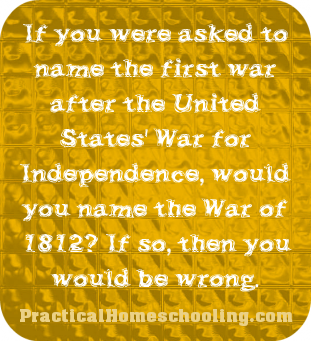Forgotten American History: The Barbary Wars
By Sam Blumenfeld
Printed in Practical Homeschooling #53, 2003.
 If you were asked to name the first war after the United States' War for Independence, would you name the War of 1812? If so, then you would be wrong.
If you were asked to name the first war after the United States' War for Independence, would you name the War of 1812? If so, then you would be wrong.

|
 |
 Recently, I visited a prestigious private school in Oregon and was joined at lunch by a group of the school's best students of high-school age. I assumed that they were well versed in American history. But to find out if I was right, I asked if they could tell me what was the first war the United States was engaged in after we had established an independent government under the new constitution.
Recently, I visited a prestigious private school in Oregon and was joined at lunch by a group of the school's best students of high-school age. I assumed that they were well versed in American history. But to find out if I was right, I asked if they could tell me what was the first war the United States was engaged in after we had established an independent government under the new constitution.
There was a moment of silence while they wracked their brains for the correct answer. "The War of 1812," they responded confidently. "No," I said. "That was not the first war we were engaged in." They seemed puzzled and disappointed. After all, they were the best students in the school. How could they be wrong? But they were. America's first conflict is known as the Barbary Wars, fought in 1801-05 and 1815 against the Islamic powers of North Africa.
The Moslems (as their name was spelled at the time) of North Africa had begun attacking and capturing the ships of Christian nations after their expulsion from Spain and France in the 15th century. By the 17th century there were as many as 20,000 Christian captives in Algiers. Ransom payments were the sole means of freeing some of the captives. Others were condemned to slavery by the Moslems.
Incapable of conquering the North African coast, the European nations were able to gain a modicum of immunity from Barbary piracy by paying an annual tribute to the governments there. Prior to independence, American shipping was protected by payments made by the British government. However, after independence, American ships were seized in the Mediterranean and their crews enslaved. In response to these depredations, the Congress voted in 1794 to build a navy. However, in 1795 and 1797, the United States signed extortion treaties with the Moslem Barbary states of Morocco, Algiers, Tripoli and Tunis, in order to protect hundreds of American merchant vessels from harassment in the Mediterranean.
However, in 1801 the Pasha of Tripoli, Yusuf Karamanli, declared war on the United States and seized several Americans and their vessels. In 1803, Commodore Edward Preble was sent out to the Mediterranean with the Constitution, Philadelphia, and several brigs and schooners. Making a naval demonstration before Tangiers, which brought the Emperor of Morocco to make amends for treaty violations, Preble set up a blockade of Tripoli itself. On October 31, 1803, the Philadelphia ran on a reef and was captured by the Tripolitans, who anchored her in their harbor. But on February 16, 1804, Lieutenant Stephen Decatur and eighty officers and men recaptured and burned her in a daring night attack.
During August and September of 1804, Preble harassed Tripolitan shipping and fortifications with frequent attacks. The massive fortifications had been built by Christian slaves. Preble's actions reached a climax when the fire-ship Intrepid, loaded with a cargo of gunpowder and explosive shells, was maneuvered into the harbor at night. But the ship exploded prematurely, doing little damage to Tripolitan shipping.
Meanwhile, William Eaton, the U.S. Consul at Tunis, got permission from Jefferson and Madison to attack Tripoli by land with the help of the Pasha's exiled older brother Hamet, whose throne had been usurped by Yusuf. With the help of seven United States Marines, Eaton was able to organize a small army made up of Greeks and discontent Arabs who marched from Alexandria to Derna, halfway to Tripoli, in thirty days. The small army, led by the seven Marines, stormed Derna, which fell after a two-hour battle.
The Pasha in Tripoli was so alarmed by the fall of Derna that he signed a peace treaty with the United States on June 4, 1805. It abolished all annual payments, but provided for $60,000 ransom money for the officers and crew of the Philadelphia.
But payments were continued to the other Barbary states until 1815, when Commodore Stephen Decatur was sent to the Mediterranean where he captured the Algerian flagship Mashuda in a fight off Cape de Gat. Appearing off Algiers, Decatur demanded and obtained a treaty humiliating to the once proud piratical state: no future payments, restoration of all American property, the emancipation of all Christian slaves, civilized treatment of all prisoners of war and $10,000 for a merchantman recently seized. And so, ended the Barbary Wars for the United States.
However, it wasn't until France invaded North Africa in 1830 and set up a permanent government there that the Barbary pirates were finally put out of business.
Lesson to be learned? We are fighting today the same kind of terrorism and barbarism we fought in our first foreign war. Only by knowing history can we learn how not to make the same mistakes of the past.